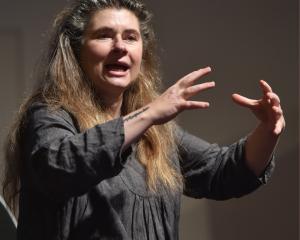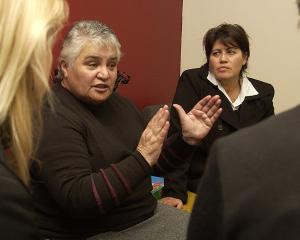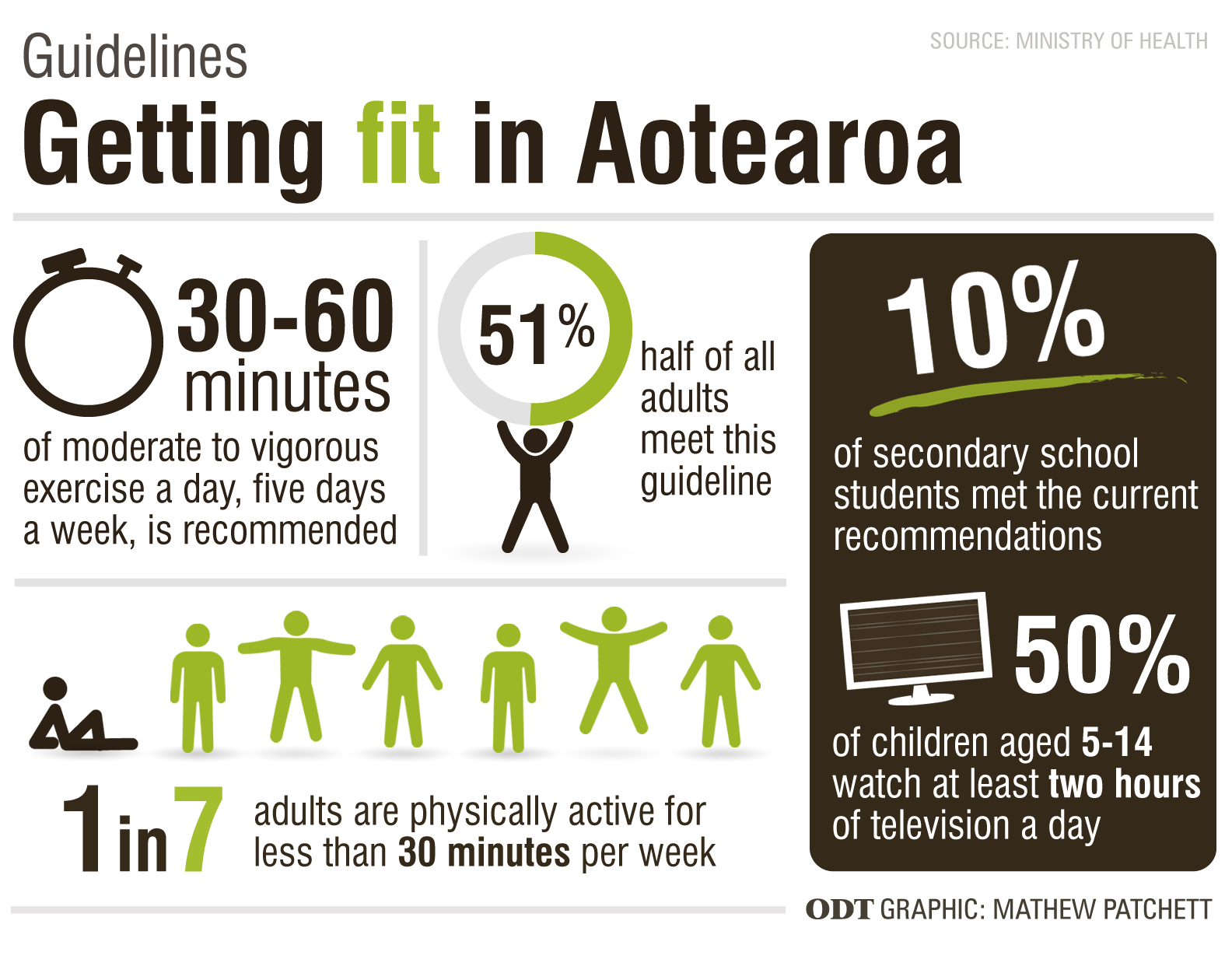
He also includes three longevity tips for those who hate exercise.
The many ways to pursue a healthy, happy and long life clamour for our attention.
According to those incessantly touting for our well-being allegiance, we should be fermenting our own kombucha, getting regular colonics, going on meditation retreats, eating a low-carb and high-fat diet, or maybe a high-carb and low-fat diet, getting a pet, monitoring our hormones, doing laughter yoga classes ... and, new for winter, 2019, taking nutrient infusions by intravenous drip.
And that's just for starters.

But there is a more direct, stay at home, one-stop-shop approach.
Many of the most sought-after health benefits can be gained with just two words: Get fit.

Whether the aim is to give health to our bodies and minds, improve our fortunes or even try to cheat death, research shows getting fit makes a surprising difference.
Or, as Associate Prof Sandy Mandic, of the University of Otago's Active Living Laboratory, puts it, "physical activity contributes to well-being, physical and mental health, disease prevention and quality of life. It also provides economic benefits and contributes to environmental sustainability.''
So, let's have a look at a bunch of those benefits and examine the degree to which physical activity helps.
Then Prof Mandic will tell us how much physical activity we need to get. She will also warn about the one thing many of us weekend warriors do that can undermine our good efforts.
For those who hate the idea of exercise, just to keep you reading (in the hope you'll unintentionally pick up something helpful), there are also three longevity tips that do not require lycra leggings and sweatbands.

GETTING FIT CAN HELP PREVENT CARDIOVASCULAR DISEASE
Studies have repeatedly shown older adults with good cardiorespiratory (heart and lung) fitness have less risk of heart attacks and lung disease.
More recent research, carried out in the United States, focused on a younger demographic. Almost 5000 participants, aged 18 to 30, ran on treadmills until they couldn't anymore.
Seven years later, half of them repeated the run. During the next three decades they were given follow-up assessments.
The results, published in The Journal of the American Medical Association, in late 2015, revealed that each additional minute beyond the baseline that a participant could run on the treadmill gave him or her a 15% reduction in the risk of having a heart attack or getting lung disease.
And what is true for healthy hearts also holds for tickers that have had surgery. Although, people did not used to think that.
In Dunedin, in the late-1960s, Dr Ted Nye came up with what was then the revolutionary notion of getting heart patients to do exercise, rather than just rest. He helped found the Phoenix Club, a patient-led, physical activity and peer support group for those who had had heart attacks or heart surgery.
The late Dr Nye's radical idea proved successful and became standard practice around the world.
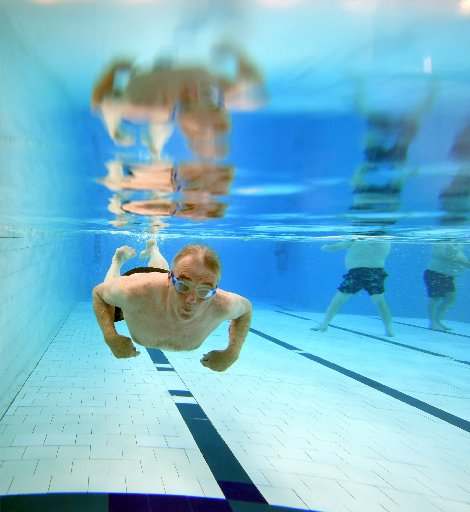
The retired Presbyterian minister became a member of the Phoenix Club after having a heart by-pass operation in 2005.
Roxborogh had been an asthmatic youngster. But, with improvements in asthma medication, he took up running in his late-20s. He was even a member of the Kuala Lumpur Hash House Harriers, when living in Malaysia in the 1980s.
The exercise regime tailed off during his 40s and 50s.
When heart disease put Roxborogh under the surgeon's knife in his 60th year, he joined the Phoenix Club as part of his recuperation.
Now 74, Roxborogh still goes to the gym and physiotherapy pool twice a week.
"It's absolutely critical for keeping going,'' he says. "Nobody can do anything forever. But I wouldn't be functioning today if it wasn't for that.''
It's not just our hearts and lungs that benefit from physical activity. Exercise reduces the risk of a wide range of physical conditions, including one of New Zealand's leading causes of health loss, obesity-driven type 2 diabetes.
That is backed up by a study of more than 1 million men, published in the Annals of Internal Medicine in February. The Swedish study, which examined heart and lung fitness and weight in young men, found those with low fitness levels were much more likely to have chronic disability later in life.
The researchers say the findings support the importance of exercise and maintaining a healthy weight early in life.
If that is not surprising, fewer people realise physical activity can reduce the risk of cancer.
Last week, research was published showing adults with a higher fitness level have a lower chance of developing lung and bowel cancer. The Johns Hopkins University study followed more than 49,000 adults aged 40 to 70, who were cancer-free.
Those with the highest fitness level had a 77% lower chance of developing lung cancer and a 61% lower chance of developing bowel cancer.

• LET'S take a brief break from all this talk about nasty exercise. Here's a health tip that does not involve working up a sweat.
Eat mushrooms.
What could be better than mushrooms topped with garlic, lemon zest, thyme and salt and then oven-roasted for 10 minutes and served hot and juicy on slices of toasted ciabatta?
Well, eating them and knowing they are not only delicious, but good for you.
Apparently, mushrooms boost the immune system and may even reduce the risk of cancer.
A report in the African Journal of Biotechnology published in 2003 says studies had shown mushroom extracts have a "potent anti-tumour effect against sarcoma, mammary adenocarcinoma, leukaemia and a host of other tumours''.
Time to get back to the physical activity.
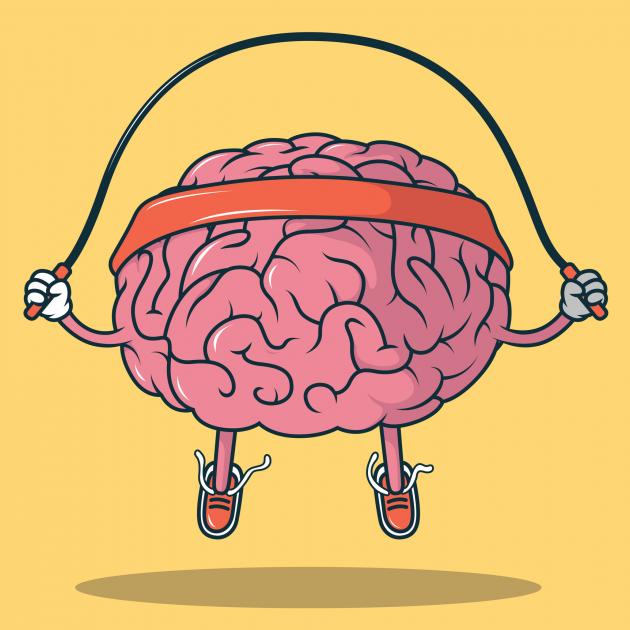
GETTING FIT ALSO SEEMS TO HELP YOUR BRAIN FUNCTION BETTER, FOR LONGER
In the British Medical Journal, in late-2017, United Kingdom doctors said the notion that exercise was just for young people needed to be challenged.
Middle aged and older people could increase their fitness level to that of an average person a decade younger, if only they would do regular exercise, the doctors said.
They added that evidence was mounting that fitness improves cognitive ability (the ability to learn, remember and problem solve) and reduces the risk of dementia.
Young brains also win when bodies are fit.
A group of international experts, writing in the British Journal of Sports Medicine, in 2016, said exercise boosts children's and young people's brain power and academic prowess.
Studies consistently show that regular exercise aids mental health.
If Sir John Kirwan says it, then it must be true. But don't just take his word for it. Sports medicine researchers in the UK reported in 2015 that, based on a study of 2000 people, joining a walking group gave significant benefits, including reduced blood pressure, lower cholesterol and less risk of depression.
And the results of a large US study, published last year, in The Lancet, showed people who exercised had fewer days of poor mental health than their peers who did not exercise. The best results were for those playing team sports, cycling or going to the gym who exercised for 45 minutes at a time, three to five times a week.

• HERE'S your promised, second exercise-free health suggestion.
Have sex.
OK, so it's not technically a non-contact sport. But it doesn't require lycra leggings or sweatbands. And making love to the one you love can feel so good you forget it is physical exercise.
On top of that, it is good for you.
Sex burns calories, gets rid of stress, improves sleep, can deepen feelings of connectedness and may even protect against heart disease.
On with the show.
GETTING FIT CAN MAKE YOU MORE VIRTUOUS AND WEALTHIER
According to Aristotle, moral virtue grows through habit. First century Christian leader Saul of Tarsus, AKA St Paul, might have been thinking about the Greek philosopher's observation when he penned "suffering produces endurance, and endurance produces character, and character produces hope''.
Fast-forward two millennia and the Dunedin Longitudinal Study is showing how true that is.
The world-renowned ongoing study of 1037 people born in 1972 and 1973 has conclusively proved that children with self-control become wealthier adults.
Here's the link to fitness. It only really happens with a bit of honest grit. Going out for that daily walk even though it's raining. Cycling to work when the sun is still in bed. Taking the stairs when the lift is simply begging to be used. Doing just one more set of 10 reps at the gym when your body screams "No!'' Getting fit requires self-control.
And according to the Dunedin Study, developing self-control has economic rewards. Children with low self-control become adults with high rates of financial problems who do not plan for their future and have low levels of wealth. The children with the most self-control become the adults with the least financial problems, do the most planning and have the most wealth.

FINALLY, PHYSICAL EXERCISE CAN HELP POSTPONE THE INEVITABLE
Not taxes. They are needed so government can function on behalf of the people and so wealth can be distributed fairly. No, getting fit can help you cheat death, at least for a while.
A couple of the studies cited above mention reducing the risk of death. The researchers at Johns Hopkins University found highly fit people who developed lung cancer had a 44% lower risk of dying and those who developed bowel cancer had an 89% lower risk of dying.
And results of the treadmill endurance tests suggest that each additional minute on the 'mill beyond the baseline is associated with a 15% lower risk of death.
Just sitting down for long periods, as so many of us do these days, is a death wish in disguise, researchers say. Last month, however, a study published by the American College of Cardiology said regular exercise could reverse the damage from a sedentary lifestyle.
The research, involving 150,000 Australians, revealed even the lowest requirements for physical activity eliminated the risk of death posed by sitting for too long.
There is, unfortunately, a caveat on that one. Sit for more than eight hours a day and a minimum amount of activity still leaves you in the cross-hairs.

• HAVING got this far, exercise-phobic reader, you deserve a final activity-free longevity tip.
Be an Ecuadorian dwarf.
This suggestion comes courtesy of www.livescience.com, which includes it on their list "Extending Life: Seven Ways to Live Past 100''.
A study of Ecuadorians with Laron syndrome, which causes dwarfism, surprised the scientists who discovered their subjects were resistant to cancer and diabetes. None of the Laron group died of these two diseases.
It turns out the condition is caused by a mutation in a protein that regulates cell growth. And the mutation's effect on the body's growth-signalling pathway also gives cancer and diabetes protection.
You might find it difficult to make use of this non-exercise health tip. Unless you were born in the right bit of South America and are of less-than-average (but perfectly acceptable, you understand) height. But, give it your best shot.
Also, keep in mind that although they did not die of diabetes or cancer, the Laron group had higher than average rates of death from accidents and alcohol-related issues.
Forewarned is fore-armed. Let us know how you go.

In her youth, Prof Mandic was a professional basketball player in her homeland, the former Yugoslavia. But she injured herself through a lack of knowledge leading to bad training techniques. Now, she is passionate about helping people learn how to get fit properly and safely.
Structural physical activity, such as going to the gym and taking aerobics classes is still good, but the new focus is on helping people integrate the physical activity they need into their busy, daily lives.
"Whatever you enjoy, do that,'' Prof Mandic advises.
If you like swimming, then swim. If you like walking, walk. Like dancing? Get on your blue suede shoes.
If you go to work, why not cycle rather than drive? Or park further away and walk from there.
The minimum we should all aim for is an accumulated 30 minutes per day of moderate to vigorous activity, five days a week, Prof Mandic says.
An hour a day is optimal.
"Accumulated'' is fine, but in spurts of not less than 10 minutes.
"Moderate'' is roughly the intensity of a brisk walk - not necessarily enough for a sweat but sufficient to raise the heart rate.
Here's the warning. Spreading the physical activity across several days is much better for us than going hard in the gym once a week. Do not sit on your butt all week and then go mad on an exercycle for 150 minutes.
"Weekend warriors, who aren't accustomed to regular physical activity, they have an increased risk of cardiovascular complications,'' Prof Mandic warns.


Amber Field, pictured above, says that after a year of getting fit and making other lifestyle changes she feels great, mentally, physically and emotionally. Photos: supplied
AMBER FIELD, of Balclutha, has experienced the benefits of making changes and getting fit.
The 30-year-old mother of two, who works as a shepherd at Finegand freezing works, reached the point where she was "tired of feeling yuck''.
Her doctor gave her a green prescription, a Ministry of Health-funded, pill-free approach to improving nutrition and physical activity.
Throughout last year, Field was able to tap into advice, support and subsidised activities to help her make changes for herself and her family.
She started taking time out for herself and her children, steadily changed what they all ate and began exercising more frequently.
Not a fan of running, Field took up swimming twice a week. She also walks twice a week and does other exercises at home.
Everything has changed, she says.
"Mentally, physically, emotionally, I feel great,'' Field says.
"Of course, there's days I still get a bit down. We're only human. But it's nice to know there's support in the background, if you need it.
"At the end of the day, it's up to you. You've got to make the choice ... No-one can do it for you.''
Green prescription
• Green prescription is a New Zealand-developed, pill-free approach to helping people build healthier, more active lives. It’s effectiveness is garnering attention overseas.
In the South, the programme is co-ordinated by Sport Otago and Sport Southland. The starting point for a Green Prescription assessment is a visit to your GP.





